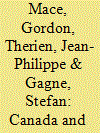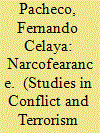| Srl | Item |
| 1 |
ID:
121216


|
|
|
|
|
| Publication |
2012.
|
| Summary/Abstract |
Since 1940 the Americas have been fairly peaceful compared to other regions
of the world. Although Central America was racked by extremely violent civil
wars during the 1980s, over the past few decades the region as a whole has
not experienced many military con?icts between states. Barely a handful of
the various territorial disputes, past or present, have led to open warfare. The
last signi?cant episode, the 1995 war between Peru and Ecuador, lasted no
more than a week. Yet this relative tranquillity must not obscure the fact that
over the years, the regional security agenda has undergone major changes.
|
|
|
|
|
|
|
|
|
|
|
|
|
|
|
|
| 2 |
ID:
093004


|
|
|
|
|
| Publication |
2009.
|
| Summary/Abstract |
Throughout the 1980s and 1990s Mexican cartels' leadership was nationalistic and entrepreneurial, focusing their efforts specifically on the profitable U.S. drug consumption market. Their goal was to subvert the Mexican state, not challenge it. Today the various Mexican cartels appear to be headless, bereft of any leadership or led by thugs who have no allegiances and have begun focusing their enterprises on the increasing national drug consumption demand. This has caused anarchy within the different cartels' ranks and among potential smaller competitors vying for territorial control resulting in an unprecedented escalation of drug-related violence that qualifies as narcoterrorism. The Mexican state is challenged directly for control over the legitimate use of force and seems unable to rein in the uncontrolled level of violence. Why? The following analysis discusses politicoeconomic as well as psychosocial factors that explain the evolution of these violent trends in Mexico, whose society demands an end to state corruption and a firm plan to ensure citizen security.
|
|
|
|
|
|
|
|
|
|
|
|
|
|
|
|